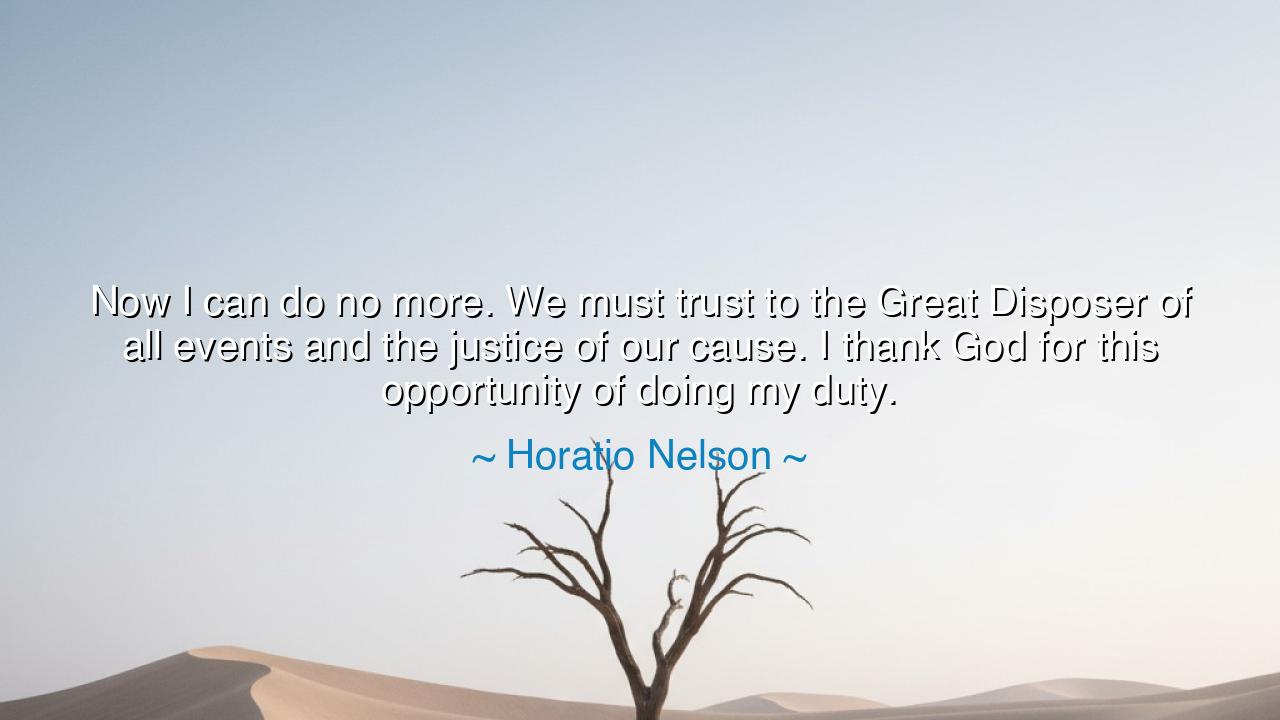
Now I can do no more. We must trust to the Great Disposer of all
Now I can do no more. We must trust to the Great Disposer of all events and the justice of our cause. I thank God for this opportunity of doing my duty.






Hear the final, solemn words of Admiral Horatio Nelson, hero of the seas, who spoke in the hour of death: “Now I can do no more. We must trust to the Great Disposer of all events and the justice of our cause. I thank God for this opportunity of doing my duty.” In this cry we hear not despair, but serenity; not fear, but fulfillment. It is the voice of a man who gave all that flesh and spirit could give, and who, at the end of his mortal strength, surrendered the outcome to Heaven.
The meaning of these words is profound. Nelson acknowledges that there comes a moment when human effort has reached its limit—when the swords have been drawn, the commands given, the battles fought. Beyond that point lies the realm of fate, where no general or king has dominion. It is there, Nelson says, that we must trust in the Great Disposer, the unseen Hand that guides the unfolding of history. At the same time, he affirms that if the cause is righteous, if the struggle is just, then one may die content, knowing one has done one’s duty. His thanksgiving to God is not for victory, but for the chance to serve with honor.
The origin of this statement is found at the Battle of Trafalgar in 1805, where Nelson led the British fleet against the combined powers of France and Spain. Struck down by a fatal musket ball, he knew his life was ebbing away even as the battle raged. Yet his heart did not waver. He had given his last commands, fought his last fight, and he accepted that the rest lay beyond him. This was the spirit of Nelson—undaunted in death, steadfast in duty, serene in trust. His words became not only his epitaph, but a guiding light for all who face the final limits of their strength.
History has often echoed this same spirit. Consider George Washington at Valley Forge, when his army starved and froze, their cause seeming lost. He too had done all he could, and beyond that, he commended his efforts to Providence. By perseverance and faith, the tide turned. Or recall Joan of Arc, who, bound to the stake, declared her trust in God even as flames consumed her. Both knew what Nelson declared: that one can only act with courage and integrity, and then leave the rest to the higher Will.
The lesson here is both heroic and humbling. Each of us has limits; no man can bend the universe wholly to his will. But what lies within our grasp—our choices, our actions, our duty—this we must embrace fully, without hesitation, without fear. And when that is complete, when nothing more can be done, then we must surrender the outcome with trust. For to obsess over what lies beyond our reach is to court despair; but to give our best and then release the rest is to walk in peace.
Therefore, O listener, take courage. In your struggles, in your labors, in your battles whether great or small, resolve as Nelson did: to give your fullest effort, to act with righteousness, to stand firm in your cause. When you have done all, do not lament the outcome, but entrust it to the Great Disposer of all events. For though victory may not always come, the honor of fulfilling one’s duty shines brighter than any crown.
So let Nelson’s final words be your guide: “Now I can do no more. We must trust to the Great Disposer of all events and the justice of our cause. I thank God for this opportunity of doing my duty.” Live so that, at the end of your labors, you too may look back with peace, knowing you gave your best, and forward with faith, knowing the rest lies in hands greater than your own.






AAdministratorAdministrator
Welcome, honored guests. Please leave a comment, we will respond soon